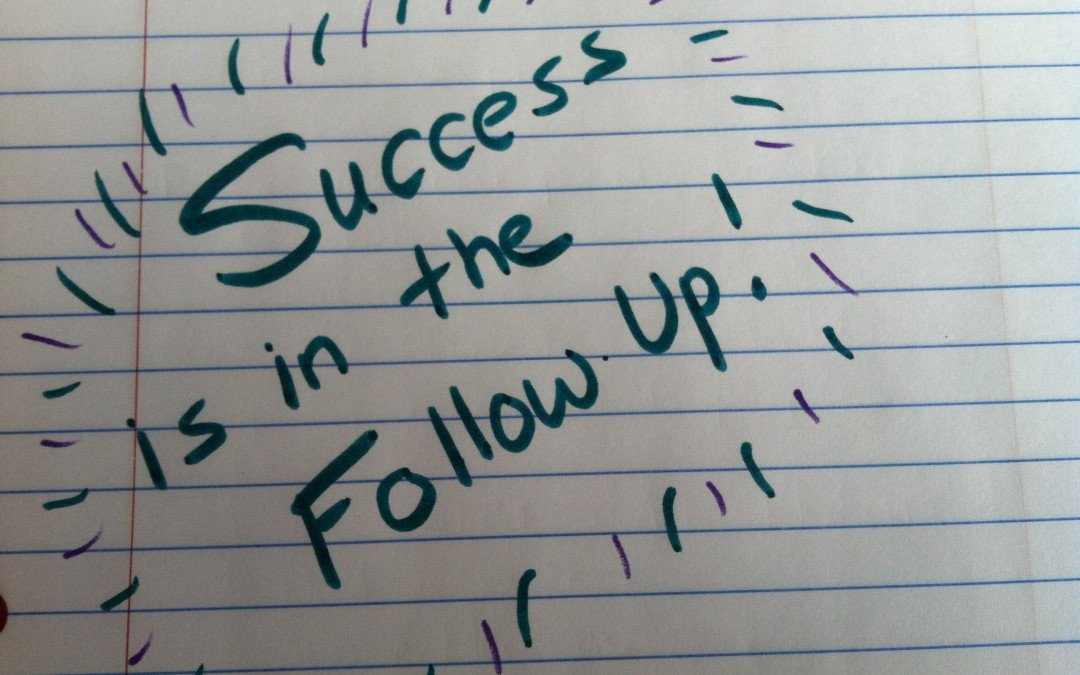
by Julia Felton | Jun 5, 2015
Recently this great information was shared with me and it was so powerful that I wanted to share it with you too because it talks to a subject that comes up with my clients time and time again. And that topic is customer follow up.
I think these statistics will shock and surprise you. So get ready:
- 48% of sales people never follow up with a prospect
This is of course shocking but not surprising. I know from my own experience how often I have expressed an interest in a product/service and then no-one has followed up with me. This is especially frustrating when I want to buy!
So why would you start a business and not follow up an incoming enquiry?????
So we continue:
- 25% of sales people make a second contact and stop
- 12% of sales people make more than three contacts
and so why is this. Well it is often that little voice in your head that says:
- “I don’t want to hassle them”
- “If they want it they will buy”
Well it seems they won’t….please read on for the most surprising stats of all…
- 2% of sales are made on the first contact
- 3% of sales are made on the second contact
- 5% of sales are made on the third contact
- 10% of sales are made on the fourth contact
- 80% of sales are made on the fifth to twelfth contact!!!
Just look at the jump between the fourth and fifth contacts.
So my friends persistence is the key to your success. I learnt this lesson the hard way from my financial adviser. I actually wanted his services but I was just way to busy to complete the paperwork. Consistently for about 10 months Nigel called me every month. Because I knew I needed his services I never found his call annoying or aggressive. I was in fact glad that he had reached out to me and reminded me of what I needed to do.
Today we are bombarded with information. We are in information overwhelm. But that does not mean someone doesn’t want your products and services. It might be, like me, it isn’t a priority right now as they are fire fighting something else. Staying connected to your prospects is key to converting them eventually. Sometimes it might feel to you like you are annoying them but rest assured this is rarely the case. In fact many are so happy to hear from you. And if you aren’t sure well just ask your prospect. Get permission to follow up with them in x days or months. Trust me it is so much easier to make those calls when you have got permission to follow up.
So go forth and make calls because the money truly is in the follow up.
Julia Felton (aka The Business Wrangler) is the founder of Business HorsePower. Business leaders, entrepreneurs and executives hire her to accelerate their business performance by harnessing the energy of their people to work more collaboratively together. By aligning purpose with actions the team achieves exponential results as everyone starts pulling in the same direction.
Julia believes that business is a force for good and through designing purpose-driven businesses that leverage the laws of nature, and the herd, you can create businesses founded on the principles of connection, collaboration and community that make a significant impact in the world.

by Julia Felton | May 20, 2015
Have you:
- Ever paid for training you never used?
- Bought books you never read?
- How about coaching you never implemented?
- Got a stack of “shelf” rather than “self” development programmes and books on your shelf?
Unfortunately this is not a rare thing–it’s rumoured that 80% of coaching clients don’t implement what they learn. I have nothing but compassion for these people because I used to be one of them. I foolishly believed that going on courses was the answer to all my problems. If I just learnt more my business would soar and clients would be attracted to me.
What I didn’t know at the time was that some deeply ingrained fears and childhood programming was preventing me from implementing what I knew I had to do. It was my mindset that was holding me back. It took investing in over 100 programmes to realise this (now that’s a lot of cash! and I don’t want you to have to go through that pain).
Initially, I’d blame the program, other times I’d blame the coach. They didn’t understand me. My business was different. But the truth of it is that I was afraid to address the inner work I needed to do. I hoped that throwing money at and buying more resources would make my fears go away, but it never did. Things only changed when I started facing my fears and doing the inner work.
Here are some ways that we avoid facing the fear:
Throwing Money At Things
Spending time creating a new website, posting on social media or just hiding out behind your computer will not help you bust through the fears stopping you becoming visible and connecting with others. So often my clients say to me that I’ll just connect with them once my website is complete. I used this strategy very effectively for years – and as some of you will know I had multiple websites to keep me busy – but this never works or helps you attract clients. Only by getting out and speaking to potential prospects can you expect your business to grow.
Throwing Money At People
Coaches and consultants are great and I am never without a coach. They can tell you what’s happening, point out patterns in you that you can’t see and give you clarity around what to do next. However, NONE of them can put a gun to your head and actually make you do the thing that makes you cringe or hide under the table. Eventually, you will have to be doing it by yourself and reconcile with your fears and demons. As I constantly tell my clients, you are 100% responsible for your results-good AND bad.
Throwing Money At Events
If you are not willing to be a different person, to act differently than what you’ve always done, what’s the point of spending money to go to networking or training events to grow your business? Buying a ticket and sitting in a seat doesn’t mean you can tick off the marketing plan ‘to do’ list. Are you trying to give advice, connections and friendliness at strangers? Are you willing to help people who look lost and alone? Do you follow up with every single person you were fortunate enough to meet? If you’re not, just stop throwing money at events in the hopes that they’ll grow your business.
Having well and truly busted myself on this, I really help that I have helped you realise that spending money on things without taking ACTION is NOT going to change your life. The only way things will change is to feel uncomfortable, step out of your comfort zone, feel the fear and take action. In fact my best advice would be to use the fear to fuel your action rather than quash it.
Julia Felton (aka The Business Wrangler) is the founder of Business HorsePower. Business leaders, entrepreneurs and executives hire her to accelerate their business performance by harnessing the energy of their people to work more collaboratively together. By aligning purpose with actions the team achieves exponential results as everyone starts pulling in the same direction.
Julia believes that business is a force for good and through designing purpose-driven businesses that leverage the laws of nature, and the herd, you can create businesses founded on the principles of connection, collaboration and community that make a significant impact in the world.

by Julia Felton | May 11, 2015
If leaders are to be successful they need to be able to influence and impact others. But what is impact and how is it created. My definition of personal impact is ‘The ability to command your audience, aligning your physiology and emotions to create the impact you intend.’ If you are able to do this it will automatically affect the tone of voice you use.
Why Physiology and Emotions?
In my workshops I often refer to the Mehrabian model on the impact of communication where 55% of what we communicate is through our physiology or our body language. This can be anything from facial expression, the way you stand or sit and breathing. It’s not about size, height or physical beauty. 38% of what we communicate is through tone of voice, which includes volume, timbre, speed, rhythm and the energy behind it.
Both tone and physiology are affected by our emotions. If you are fearful, happy, stressed it will show in both and people unconsciously read these. This leaves 7% of the impact in the words you use. It’s important to recognise that all 3 elements are significant and have to be aligned. Saying you are happy when your voice tone and body are clearly saying something different gives an incongruous message, as you are not being authentic and people immediacy recognise this. Admittedly sometimes this acknowledgement is not even conscious. When others experience us as inauthentic and incongruent it makes them wary of us as they are not sure what to expect and in a sales situation people will not buy from you.
So how do you create an impact?
The best way to create the impact you desire is firstly to be clear on what impact you want to create. This mean being authentic and having clarity on the outcome you want. Being laid back is great if that is the impact you want to create but this might not be the right approach if you want people to listen to your message and remember it.
Remember you create an impact from the moment you walk in a room or someone sees/hears you for the first time. Here are some simple steps you can begin to practice to create the impact you desire.
- Ask yourself – what is my intention in the meeting? What result do I want? What atmosphere do I want to create? Having got clarity on this;
- Ask yourself – how do I need to be to create/deliver this? What do I need to embody? Visualise how you will be walking into the room and interacting with others
- As you do this go through a basic centring practice:
- Stand with your feet hip width apart, balanced equally on each foot with your knees relaxed.
- Lift your rib cage slightly and relax your shoulders so you stand tall yet relaxed.
- Lift you head a look straight ahead, relaxing your jaw in the process.
- Now, if your breath hasn’t already shifted breath into your abdomen.
- Notice the shift in your body and your breath and the energy you need to create and project.
- If possible practice how you need to be.
Now, after the event reflect:
- Did you create the impact you wanted?
- If yes what did you learn that you can repeat or do more of?
- If not what did you notice about how you were? When did you ‘lose it?’
- What do you need to practice to do better next time?
- If possible get feedback.
In my experience the times I fail to make the impact I desired occur when I stop being authentic and try to be someone else. When I lack authenticity it becomes difficult to connect with the other person and communication channels become blurred. One of the best teachers I have ever come across when it comes to learning how to create an impact and be authentic are my horses. They never fail to give me honest feedback.
So if you are interested in developing your authentic communication skills I invite you to join me for the upcoming Art of Authentic Communication Workshop where my herd of horses will be your teachers.
Julia Felton (aka The Business Wrangler) is the founder of Business HorsePower. Business leaders, entrepreneurs and executives hire her to accelerate their business performance by harnessing the energy of their people to work more collaboratively together. By aligning purpose with actions the team achieves exponential results as everyone starts pulling in the same direction.
Julia believes that business is a force for good and through designing purpose-driven businesses that leverage the laws of nature, and the herd, you can create businesses founded on the principles of connection, collaboration and community that make a significant impact in the world.
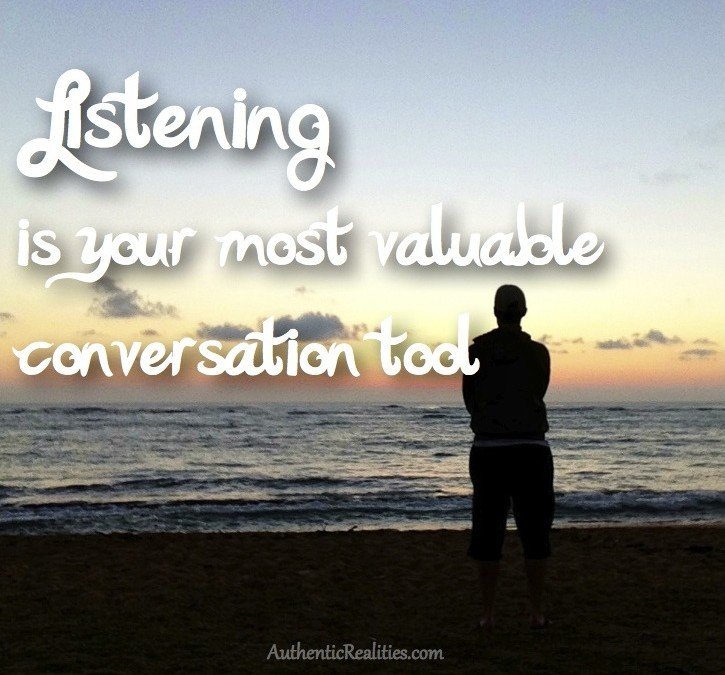
by Julia Felton | May 5, 2015
Our brains are hard-wired to do the opposite of listening unconditionally— listen for quick judgements. Our hunter-gatherer ancestors who could make quick determinations between the rustling of grass or a tiger survived. Those that wandered around, taking it all in, became lunch.
Our world today is different, and we are less likely to take creative risks or share with someone that we feel has passed judgement on us. According to Judith Glaser, author of Conversational Intelligence, the main purposes of listening are to judge, to reject or to connect. People determine if they are being judged or connected to in .07 seconds. How do you feel when you sense you’re being judged? How creative are you? Are you good at solving problems? Do you feel inspired? Thoughtful? Or do you want to find the safest answer as fast as you can in order to get out of the conversation?
If you listen unconditionally, that means that you are going into the conversation with the primary purpose of connecting, not deciding if you are going to accept or reject what the other person is talking about. Regardless of what the other says, you are coming from a place of curiosity. Nothing said will faze you. Next time you have a conversation, whether with a client, family member or coworker, rather than start with your thoughts, ask the other person for theirs. Continue to ask open-ended questions and just… listen. Do not analyze, do not plan, do not start making any choices. Then ask another open-ended question. If you’re stuck, one way to practice coming up with questions is using the click-down tool. Find the key word or phrase that would be blue and underlined if the conversation was transcribed on a webpage, and ask an open-ended question about it.
Listening unconditionally is not easy, but it is not impossible. In fact, the more you practice it the more natural it will become. So I challenge you. See how many conversations you can have in the next week where you only ask questions. You will find that you talk less and hear a lot more. In fact, you may even be inspired.
If you want to develop your listening skills then I invite you to join us at the Art of Authentic Communication Workshop being held as part of International Coaching Week.
Julia Felton (aka The Business Wrangler) is the founder of Business HorsePower. Business leaders, entrepreneurs and executives hire her to accelerate their business performance by harnessing the energy of their people to work more collaboratively together. By aligning purpose with actions the team achieves exponential results as everyone starts pulling in the same direction.
Julia believes that business is a force for good and through designing purpose-driven businesses that leverage the laws of nature, and the herd, you can create businesses founded on the principles of connection, collaboration and community that make a significant impact in the world.

by Julia Felton | Apr 28, 2015
Whilst good communication and leadership are all important, both in business and when working with horses, it is connection that forms the essential foundation of this triage. This is because if you can connect with others at all levels — one on one, in groups and with an audience — then relationships are stronger, your sense of community and belonging improves, your ability to create teamwork increases and your influence and productivity expands.
However, when people come to us with a problem, it’s easy to lapse into behaviours that — although usually well-meaning — serve to block us from hearing the other person’s experience, and so block the connection. We’d be better off following the words of this inside-out saying: “Don’t just do something; stand there”…and try not to:
- Counsel. Seek not to advise solutions (until asked) but listen and reflect back the person’s experience.
- Defend. When you explain, justify or rationalize, you invalidate the other’s experience. You can create a time to offer your experience, but for now, just listen.
- Shut down. This happens in parenting when we say things like: “Stop crying. It’s not that bad.” Children are more likely to stop crying when they feel they’ve been heard.
- One-up. Saying, “Oh, that’s nothing! Listen to what happened to me!” gives the message, “Your experience doesn’t count.”
- Reassure. It’s OK for people to feel their feelings. When we try to console (“It’s not your fault; you did the best you could…”), we take people out of their feelings.
- Pity. Sympathy and pity (“Oh, you poor thing!”) are very different from empathy, which is simply a respectful understanding of what others are experiencing.
- Commiserate. Sharing stories of your own similar experiences is not showing empathy; it turns the focus away from the person with the problem.
- Correct. First listen. After the other person feels fully understood, then see about correcting any misunderstandings or inaccurate impressions.
- Enlighten. Don’t attempt to educate unless your opinion is asked.
- Interrogate. Too many questions distract from the feelings at hand.
Learning to connect is one of the most important skills that we can learn, and it starts off by being genuinely interested in the other person and how they are feeling. Listen to what they are saying with your entire body, stay present and focused, be curious. If you exhibit all these skills then people are more likely to connect with you. Interestingly, these too are the skills required to connect with a horse which is why horses are the teachers on the upcoming Art of Authentic Communications workshop. You need to be able to communicate to connect.
The benefits of learning to communicate and connect are immense: better personal and family relationships, better business relationships and in general a better experience of life.
Julia Felton (aka The Business Wrangler) is the founder of Business HorsePower. Business leaders, entrepreneurs and executives hire her to accelerate their business performance by harnessing the energy of their people to work more collaboratively together. By aligning purpose with actions the team achieves exponential results as everyone starts pulling in the same direction.
Julia believes that business is a force for good and through designing purpose-driven businesses that leverage the laws of nature, and the herd, you can create businesses founded on the principles of connection, collaboration and community that make a significant impact in the world.

by Julia Felton | Apr 21, 2015
I was recently reading an article by Jim Rohn in which he said:
“Failure is not a single, cataclysmic event. We do not fail overnight. Failure is the inevitable result of an accumulation of poor thinking and poor choices. It is nothing more than a few errors in judgement repeated every day.
And failure’s most dangerous attribute is its subtlety. In the short term, small errors don’t seem to make any difference—we do not seem to be failing. In fact, sometimes these accumulated errors in judgement occur throughout a period of great joy and prosperity in our lives. Because there are no instant consequences to capture our attention, we simply drift from one day to the next, repeating errors, thinking the wrong thoughts, listening to the wrong voices and making the wrong choices. It is imperative to refine our philosophy in order to be able to make better choices.”
and it got me to thinking that relationships do not just disintegrate over night. They fall apart because of a consistent failure of communication.
Research studies tell us that 70% of workplace mistakes are a result of poor communication. Communication failures can be costly. It can cause loss of business, accidents, frustration, hostility, high employee turnover, low productivity and much more.
When we think about a failure in communication we often assume that two people have not spoken to each other about the issue. Maybe they have avoided having a conversation for fear of reprisals or have been afraid about how the other person will respond. However, communication is a two way street and it relies on:
- the ability to ask for what we want and
- the ability to really listen to what the other person needs.
Stephen Covey describes this ability to really listen to what the other person is saying as empathetic listening. It means listening with intent to really understand what is happening for the other person. Through empathic (from empathy) listening you can get inside another person’s frame of reference and see and experience the world through their eyes. This enables us to connect at a much deeper level.
However, empathetic listening is only possible when we are being truly authentic. When we are showing up as ourselves with no personal agenda and are open to hearing someone else’s point of view. Remaining authentic in our communication takes time and practice but impact is profound.
Julia Felton (aka The Business Wrangler) is the founder of Business HorsePower. Business leaders, entrepreneurs and executives hire her to accelerate their business performance by harnessing the energy of their people to work more collaboratively together. By aligning purpose with actions the team achieves exponential results as everyone starts pulling in the same direction.
Julia believes that business is a force for good and through designing purpose-driven businesses that leverage the laws of nature, and the herd, you can create businesses founded on the principles of connection, collaboration and community that make a significant impact in the world.
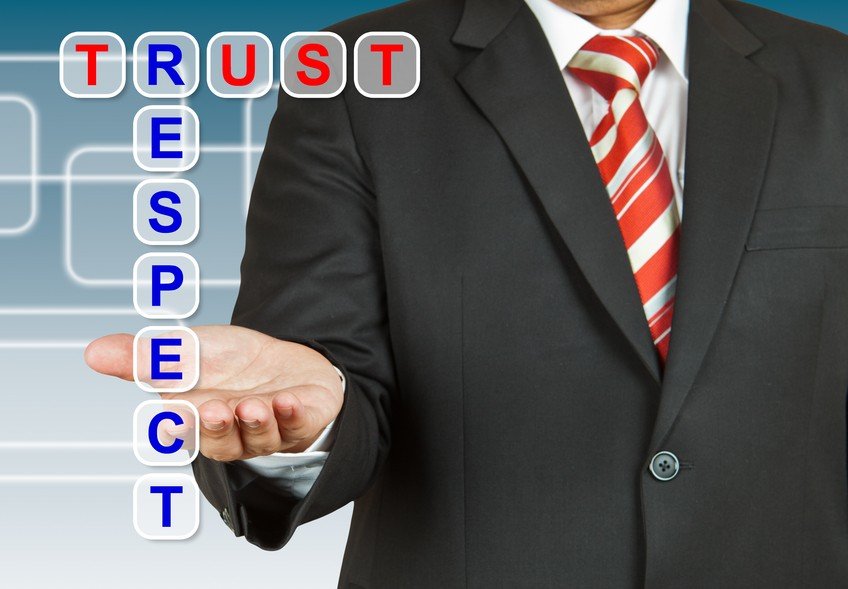
by Julia Felton | Apr 15, 2015
This week as I’ve been preparing for the Building Relationships To Build Your Business Workshop which I am hosting this weekend, I got to thinking about the relationship between trust and respect. Trust and respect are foundations of building great relationships whether in life or business, but how do these apply to leaders?.
Can you trust someone you don’t respect? Can you respect without trust? In all my years of being in business I can’t recall anyone that I really respected and who I didn’t trust. Although recently I did come across a stallion horse that I certainly respected for his power and presence, but to be honest I didn’t really trust him. In fact he intimidated me, and I was a little afraid, however I did trust myself that I knew enough to keep me safe by keeping him out of my personal space.
So whilst trust and respect can exist independently, it’s when they co-exist together that something magical happens. It is definitely a case of 1+1=3.
So let’s be clear on what are trust and respect. Trust is defined as reliance on the integrity, strength, ability, surety, etc., of a person or thing whilst respect is defined as a deep admiration for someone’s abilities, qualities or achievements.
So how do you build trust and respect with others? Here are six practices you can engage with:
1. Model The Way
“What you do speaks so loudly I cannot hear what you say. “ ~ Ralph Waldo Emerson
Both trust and respect are earned. The fastest way to earn them is to give them: Show others trust, give others respect.
2. Keep Your Commitments
Do what you say you will do. So if you agree to follow up with someone then make sure you do it. This builds credibility and shows you are reliable. And if for some reason circumstances change make sure you circle back and explain why you can no longer keep this commitment and ask to be released from your original promise.
3. Listen To Communicate
Being a great communicator means listening with your mind as well as your heart. What is being communicated by what isn’t being said? Listen to people and consider what they have to say with an open mind. Great communicators address both the “why” and the “how” of the situation. Trust your gut and learn to ask great questions.
4. Prepare for Confidence
Respect is born through the competence you show, one of the 5 pillars of trust. (The 5 pillars are Caring, Commitment, Consistency, Competence and Communication) Have the confidence born of knowledge and experience. When you speak, know what you are talking about. Remember, though: confidence is not arrogance; a confident leader is willing to admit his mistakes; hiding them is a sign of duplicity.
5. Make People Feel Safe
Create an environment where everyone feels that they can express their viewpoint. Respected leaders acknowledge they don’t know everything and they can learn a lot from other people. Keep an open mind and appreciate that everyone has something to teach you.
6. Lead From The Front
Do you want trust and respect from others? Start by trusting and respecting yourself. It means not putting yourself down when you make a mistake; own up to it and move on. Let yourself take risks based on your own values and strengths. Listen to that “inner voice” guiding your decisions.
What else are you doing to build trust and respect? I’d love to hear as the same principles apply whether you are building trust and respect with prospects, clients, suppliers or even your horse.
Julia Felton (aka The Business Wrangler) is the founder of Business HorsePower. Business leaders, entrepreneurs and executives hire her to accelerate their business performance by harnessing the energy of their people to work more collaboratively together. By aligning purpose with actions the team achieves exponential results as everyone starts pulling in the same direction.
Julia believes that business is a force for good and through designing purpose-driven businesses that leverage the laws of nature, and the herd, you can create businesses founded on the principles of connection, collaboration and community that make a significant impact in the world.
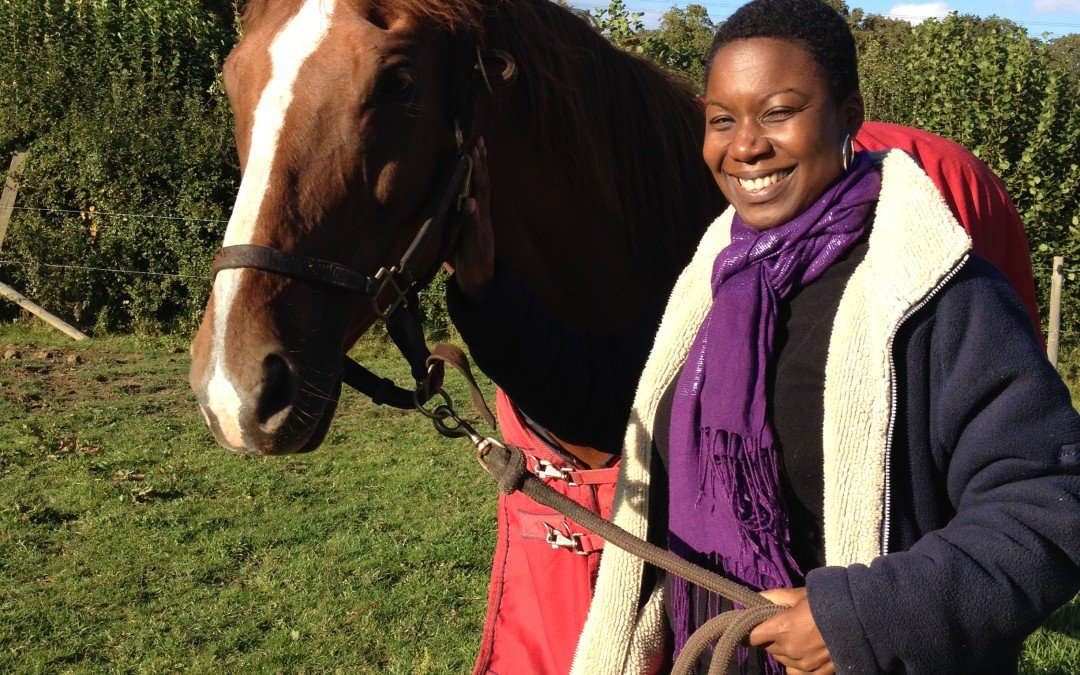
by Julia Felton | Apr 11, 2015
Happy 15th Birthday to Coach Charlie!.
As I’ve been watching the adverts for the upcoming Grand National this year, I couldn’t help but think about what happens to all those race horses after their competitive racing life is over. Although there are no comprehensive statistics on the subject it is estimated that “many thousands (of horses) are slaughtered annually in the UK and Ireland, after failing to make the grade as racers or when their racing days are over.”
There are a number of great establishments such as Retraining Of Racehorses (RoR) that seek to help race horses make the transition from the track into becoming a domesticated ridden horses but what about the race horses that are no longer rideable. Unfortunately in our society many of these find themselves on the way to the slaughter house.
This was the case with Charlie (aka Caymen’s Gift). Originally he came into my life as a riding horse but it soon became apparent that years of racing had taken their toll on his body physically and that he was experiencing arthritis and back pain. As stoic as he was he had kept on working despite being in some degree of pain. After some extensive veterinary investigations he was diagnosed as being lame on three legs and having a sore back. His riding days were over and to many people his usefulness would have come to an end, but Charlie was fortunate.
In the intervening years I had stumbled across the concept of coaching with horses. This is where people partner with horses to help business owners develop key leadership, team-working and communication skills. After 20 years of working in the corporate world and with a love of horses, this was the perfect new career for me and Charlie was a perfect coach for this work. Accustomed to being around people he easily made the transition into the Business HorsePower team and is now one of my lead coaches.
Since no riding occurs in my programmes Charlie is able to continue to contribute in a really positive way to society. Every year he helps business owners and their teams gain 100% unbiased instant feedback on their performance which is hard to ignore. He senses whether you are congruent and aligned in heart, body and spirit and has an innate ability to see deep into your soul and challenge those beliefs and false self-images that our ego puts up to protect us. He is also a master at ensuring you communicate clearly and authentically because if you don’t show up as a compelling leader him he will just ignore you and “go on strike”, just as one of my clients experienced the other day.
If you’d like to come and learn from Coach Charlie how to lead and inspire others, develop trust through the art of non-verbal communication and become a true leader then please reach out to us at connect@businesshorsepower.com and join the many others that Charlie has helped.
You can also find further information here.
Julia Felton (aka The Business Wrangler) is the founder of Business HorsePower. Business leaders, entrepreneurs and executives hire her to accelerate their business performance by harnessing the energy of their people to work more collaboratively together. By aligning purpose with actions the team achieves exponential results as everyone starts pulling in the same direction.
Julia believes that business is a force for good and through designing purpose-driven businesses that leverage the laws of nature, and the herd, you can create businesses founded on the principles of connection, collaboration and community that make a significant impact in the world.
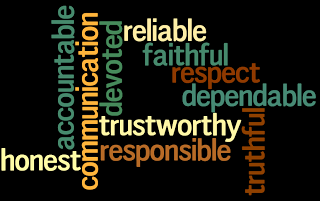
by Julia Felton | Apr 7, 2015
Trust is not an abstract, theoretical, idealistic goal forever beyond our reach. Trust—or a lack of it—is inherent in every action that we take and affects everything that we do. Trust is the cement that binds relationships, keeping spouses together, business deals intact and political systems stable. Without trust, marriages fail, voters become apathetic and organizations flounder. Without trust, no person or company can ever hope for excellence.
The truth is, trust must be carefully constructed, vigorously nurtured and constantly reinforced. Although it takes a long time to develop, it can be destroyed by a single action. And once lost, it is exceptionally difficult to re-establish.
Over the years horses have taught me much about how to build trust. The best lessons probably came from Bunny and Red, two rescue horses that were terrified of people. In order to build their trust I had to demonstrate consistent, credible behaviour. I had to do what I told them I would do, continually following through and also rewarding and acknowledging them for every action they took that enhanced our relationship. The truth is that it took a long time to build trust with these horses, but once formed we had an amazing relationship that still exists today. However, I am all too aware of how fragile that trust is and how easily it could be lost.The same principles for building trust with the horses can be applied to building more trustful relationships in business. Here are 14 things to remember when building trust, adapted from
Follow Your Conscience by Frank Sonnenberg:
1. Be straight with people. Tell it like it is.
2. Don’t be afraid to present bad news. It’s worse to sweep it under the rug.
3. Remain calm, cool and collected during difficult times.
4. Present both sides of an issue. (Let them judge for themselves.)
5. Be a good listener.
6. Disclose potential conflicts of interest.
7. Even a tiny exaggeration can destroy your credibility.
8. Always tell the truth or the truth will tell on you.
9. Your actions “off-stage” (like at an office party or on Facebook) impact your trust and credibility.
10. “Everybody does it” is a poor excuse for doing it yourself.
11. Learn how to disagree without being disagreeable.
12. Repeating a rumor is as vicious as starting one.
13. People will test you in small ways before trusting you outright.
14. The only thing worse than talking about others is talking about yourself.
If you’d like to learn how to build trust in your organisation then I’d be happy to talk with you because it has been shown that the higher the levels of trust in business the more profitable and successful the business can be.
Want to find out where you are most trusted in business, then take the free assessment here.
Julia Felton (aka The Business Wrangler) is the founder of Business HorsePower. Business leaders, entrepreneurs and executives hire her to accelerate their business performance by harnessing the energy of their people to work more collaboratively together. By aligning purpose with actions the team achieves exponential results as everyone starts pulling in the same direction.
Julia believes that business is a force for good and through designing purpose-driven businesses that leverage the laws of nature, and the herd, you can create businesses founded on the principles of connection, collaboration and community that make a significant impact in the world.
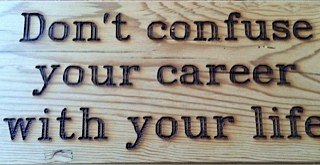
by Julia Felton | Mar 31, 2015
I don’t know about you but when I talk with many of my clients I often find that despite the fact that they are striving for success in their business, they are also engaging in acts that sabotage that success. I know that has been the case for me recently.
I have this picture in my bedroom that says: “Don’t confuse your career with your life”. I brought this when I was working in the corporate world but I have realised that this paradigm is still true for me when I’m running my own business. So many of us get focused on the success of our businesses that we fail to stop and review what is really going on in our lives.
There are definitely situations I am tolerating as a business owner that I would not when I was an employee, and to be truthful some of these are making me miserable. So why am I doing that? Why I am sabotaging my business success?
The irony is that ambition and the desire for success can in fact become the very thing that can sabotage your chances for success.
So, if you’re feeling physically or mentally burned out, there comes a point where you have to ask yourself, Is my career ambition taking over my life?If you don’t want your career ambition to block your own success her are four ways to keep that from happening:
1. Break the multitasking habit.
I have to confess that I’m a work-in-progress when it comes to realizing that multitasking is not my friend. I knew I had a serious problem when one day I looked up and realized that I had a notebook, laptop and iPhone all in front of me, and I was trying to do something different on each of them. Needless to say I wasn’t very productive and ended up with a bunch of partially finished things—not one thing actually completed.
No matter how skilled you think you are at dividing your attention, you really are more effective when you focus and break that Entrepreneurial ADD problem. Don’t jump ahead or try to do it all at once in an effort to save time. You’ll feel more accomplished, building momentum you need to go onto the next task, if you complete just one task at a time.
2. Catch some real Sleep.
Forget what you heard about sleep-deprived super-successful people. Getting no sleep and working through the night is overrated—the all-nighter, “I-only-need-four-hours-of-sleep” bit isn’t something to brag about. Because no matter how late you stay up, if you aren’t productively knocking things off your to-do list, it doesn’t really matter.
And if you’re waking up tired every morning, you will end up cranky and frustrated—and unproductive. Both your mind and your body need that time to rest and recover, to wake up refreshed. It’s not just OK to get that eight hours—it’s necessary to be at your peak, personally and professionally – and that happens when you get uninterrupted, deep sleep.
3. Stop comparing yourself to other people.
I have to confess to be a comparitus addict. I do it all the time, often under the guise of research. Every time I’m on LinkedIn or Facebook, I see what other business owners are achieving and compare myself to them. This then makes me feel bad that I’m not as successful in meeting my goals.
The thing about comparing yourself to others’ achievements is that there is never a win. Someone will always seem to be one step ahead of you. Make a commitment to only compare yourself to the best version of you.
4. Remember to make time for family and friends.
I get it. You’ve found your passion and you’re excited to get to work to make it a reality. You’re so excited and motivated that you’ve forgotten you need to spend quality time with the important people in your life.
Any relationship takes work—contact and communication—in order for it to stay alive, so make some time. You can’t discuss all of the progress you’re making in your career with your computer, and believe me, you don’t want to suddenly realize the only person you’ve had a real conversation with lately is Siri or your horses!. I’ve been told many times by my friends that I just need to take a break, have fun and “turn my brain off.” While I haven’t quite mastered that yet, what I have learned is that I don’t have to figure everything out right now.
So just remember work is just one part of your life and that whatever you are working on can wait for a minute or even an hour or two. Don’t be afraid to turn your brain off and rest and relax.
Julia Felton (aka The Business Wrangler) is the founder of Business HorsePower. Business leaders, entrepreneurs and executives hire her to accelerate their business performance by harnessing the energy of their people to work more collaboratively together. By aligning purpose with actions the team achieves exponential results as everyone starts pulling in the same direction.
Julia believes that business is a force for good and through designing purpose-driven businesses that leverage the laws of nature, and the herd, you can create businesses founded on the principles of connection, collaboration and community that make a significant impact in the world.
















